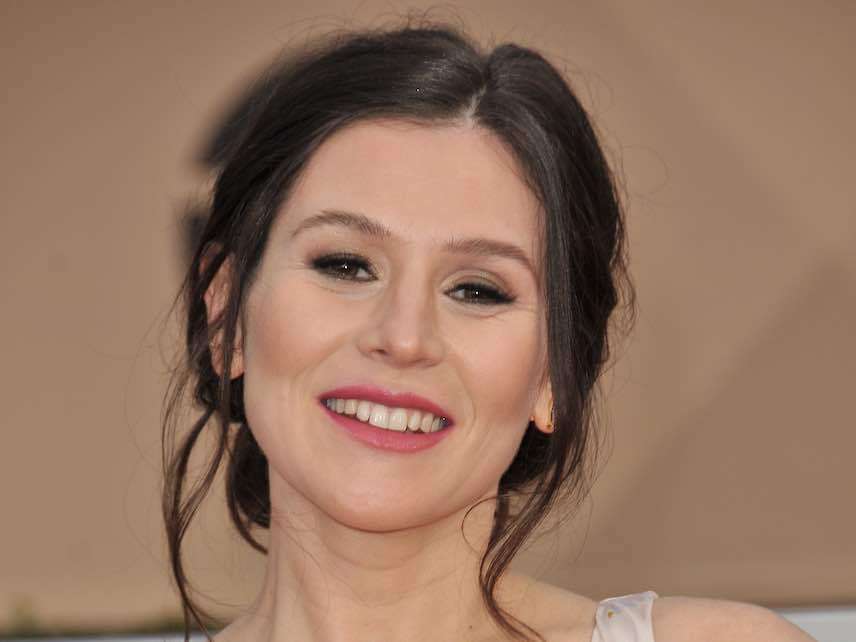You Can't Have #MeToo Without Free Speech. Just Ask Australians.
Due to the country's terrible libel laws, Yael Stone's accusation against Geoffrey Rush could put her at risk of a lawsuit.

Australian actress Yael Stone (Orange Is the New Black) recently accused the actor Geoffrey Rush (Pirates of the Caribbean) of making inappropriate sexual overtures during the time that they worked together on a 2010 stage production, The Diary of a Madman. Rush responded that the allegations are "incorrect and in some instances have been taken completely out of context."
Stone told her story to The New York Times' Bari Weiss, who explains why it's uniquely difficult for Stone to speak about what happened: Australia's defamation laws are absurdly unfriendly to free speech, and it is very easy to sue someone for making disparaging claims—even if the claims are true.
In the United States, the legal burden is on the person who claims to have been defamed: He or she must prove that the allegations are false. In Australia, in the area of libel law, it's the opposite. The burden is on the publisher to prove that the allegations against the plaintiff are true. In addition, public figures who sue for libel in the United States must prove that the publisher acted with reckless disregard of the truth, even if the statements prove false.
Australia's defamation laws help explain why the #MeToo movement, while managing to take down some of the most powerful men in the entertainment and media industry in the United States, has not taken off there.
"Australia is the only Western democracy without an explicit constitutional protection for freedom of speech," Matt Collins, a defamation lawyer and the president of the Victorian Bar, told me. "People say that Sydney is the libel capital of the world," he added.
Indeed, Rush previously sued The Daily Telegraph for reporting on allegations of sexual misconduct against the actor on the set of a 2015 production of King Lear. A decision in that case is expected to be reached next year.
Australia's limits on speaking freely go beyond libel laws. An Australian court has even barred news outlets from reporting on the sexual abuse allegations levelled against a Catholic cardinal, George Pell. The Washington Post's Margaret Sullivan discussed the ridiculous gag order in a recent article:
The story is, indeed, a blockbuster, especially for Australian citizens: Cardinal George Pell, sometimes described as the third-most-powerful Vatican official, was convicted of all charges that he sexually molested two choirboys in Australia in the late 1990s. (Pell, 77, has been the Vatican's chief financial officer in recent years; he earlier was the archbishop of Sydney and of Melbourne.)
But because of a court-issued gag order intended to preserve impartiality, the news media has been forbidden from publishing news in Australia on the details of the Melbourne trial, and now on the unanimous decision of the jury.
Suppression orders—almost unheard of in the United States—are fairly common in Australia. But they are true anachronisms in the digital age, where information, thankfully, can't be shut up in a padlocked barn.
In the meantime, publications worldwide are treading carefully, as they try to avoid legal trouble.
People accused of sexual misconduct deserve due process, and journalists should tread carefully before labeling anyone a predator. But they must be free to discuss the allegations in the first place. Depriving the public of access to information serves hardly anyone's interests, and is an obvious betrayal of fundamental free speech principles.
Unlike Australia, the U.S. has strong free speech protections, thanks to the First Amendment. When powerful people do bad things, it's easier to call them out, which is why President Donald Trump frequently complains that U.S. libel laws are too weak to shield him from criticism. Robust free speech norms make accountability easier and aid the pursuit of justice.
That's why it's so frustrating to watch many activists, often on college campuses, complain that they are insufficiently protected from hate speech. "Hate speech" is a component of free speech, and if the First Amendment ceased to protect the former, we could quickly find ourselves in the sort of society where speaking truth to power was subjectively considered "hateful" by the relevant adjudicators. Countries that don't explicitly permit virtually all kinds of speech often default to a regime of de facto censorship that can undermine progressive causes. Australia, in Weiss' telling, provides a strong example of this.


Show Comments (120)